Former players
Goalkeepers
- Fabrice Catherine
- Aurélien Hérisson
- Andreas Isaksson
- Patrice Luzi
- Florent Petit
- Simon Pouplin
- Christophe Revault
Defenders
- Lucien Aubey
- Adailton
- Carlos Bocanegra
- Guillaume Borne
- Grégory Bourillon
- Amadou Coulibaly
- Elderson Uwa Echiejile
- Erik Edman
- Rod Fanni
- Jacques Faty
- Petter Hansson
- Maxime Le Marchand
- Gilbert Manier
- John Mensah
- Mario Melchiot
- Prince Oniangue
- Abdeslam Ouaddou
- Jean-Joël Perrier-Doumbé
- Yoann Pivaty
- Alain Rochat
- Laszlo Sepsi
- Arthur Sorin
- Djimi Traoré
Midfielders
- Cédric Barbosa
- Bruno Cheyrou
- Étienne Didot
- Papakouli Diop
- Yoann Gourcuff
- Junichi Inamoto
- Cyril Jeunechamp
- Kim Källström
- Felix Katongo
- Stéphane Mbia
- Arnold Mvuemba
- Jimmy Nirlo
- Olivier Sorlin
Forwards
- Ismaël Bangoura
- Jimmy Briand
- Emerson
- Julian Esteban
- Alexander Frei
- Asamoah Gyan
- Youssouf Hadji
- Yohann Lasimant
- Damien Le Tallec
- Hicham M’Laab
- Olivier Monterrubio
- Benjamin Moukandjo
- Daniel Moreira
- Stéphane N’Guéma
- Mickaël Pagis
- Moussa Sow
- Olivier Thomert
- John Utaka
- Sylvain Wiltord
Staff technique
- André Amitrano
- Laszlo Bölöni
- Landry Chauvin
- Guy Lacombe
- Christophe Lollichon
- Alain Ravera
- Philippe Redon
- Joaquim Rolao Preto
- Christian Schmidt
- Michel Sorin
Derniers articles de la rubrique
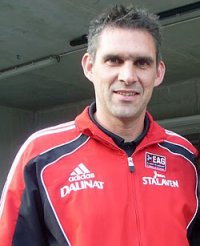
Jocelyn Gourvennec was one of the iconic players of Stade Rennais during the 1990's. He began his career with Lorient and played his first game in Division 2 aged only 16 in 1988. During three years he experienced the chaotic life of a club still having a half-professional status and doing ups and downs between D2 and D3. In 1991, Stade Rennais recruited him as a trainee professional. In the same time, Gourvennec was following Sport Science studies at the university, but soon expectations from professional football caught up with him. Between 1992 and 1994 he truly broke through to become one of the most sought after youngsters in the second division. Big clubs from D1 were soon keeping tabs on him, and Gourvennec joined Nantes in 1995, a club he would play with during the following three seasons. After two shorts spells in Marseille and Montpellier, he came back to Stade Rennais in January 2000, but his second time in Rennes wouldn’t have brilliance of the previous. Not very used by Christian Gourcuff in 2001-2002, he played two more seasons in Ligue 1 with Bastia and ended his career in L2 with Angers and Clermont. At the end of his professional career he joined the FC Rezé in 2006, preparing his coaching degrees at the same time. After a first experience in La Roche-sur-Yon, he joined Guingamp in summer 2010.
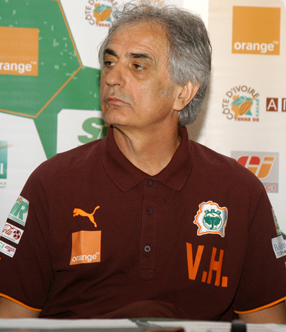
A Forward during his playing career, Vahid Halilhodžić made Velež Mostar and Yugoslavia selection happy in the 1970’s. Transferred in France in 1981, he first played with Nantes, then with Paris Saint-Germain and was crowned the best goal scorer in D1 in two occasions. In 1990, Halilhodžić began his reconversion as a coach. His first great achievements were obtained in Morocco with Raja Casablanca, but he really broke through when managing Lille. He led the club from the depths of D2 to the Champions League. His charismatic personality and his dictatorial attitude with his players made him famous and gave him a distorted image, largely exploited by the media. In 2002, in opposition with the lack of ambition shown by his management, he left Lille. A few months later, Stade Rennais, who had just dismissed Philippe Bergeroo, called him. His methods turned some players against him, but Halilhodžić fulfilled the terms of his contract by maintaining the club in Ligue 1. Attracted by Paris Saint-Germain, he initially managed some great successes there, but his Parisian adventure eventually ended in failure. Dismissed in February 2005, the Bosnian worked successively in Turkey, Saudi Arabia, Ivory Coast and Croatia. In June 2011, he was named as the manager of the Algerian national team.
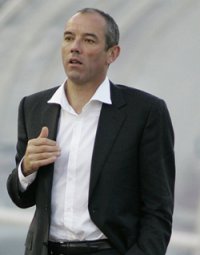
Born in the Finistère, Paul Le Guen started his professional career with Brest. After several seasons there, he moved to Nantes, and then two years later to Paris Saint-Germain, where he stayed for the rest of his playing career, and where he built up nice achievements. In 1998, the midfielder retired and immediately became coach of the ambitious Stade Rennais, freshly bought by François Pinault. His first season was very good and the club qualified to the Intertoto Cup, in which Rennes faced the Juventus of Zinedine Zidane. The next years were more difficult, especially in 2000, where Rennes avoided the drop to second division on the last match only. In conflict with his management, Le Guen left the club after three years spent in Rennes. He then became the coach of Olympique Lyonnais, where he won three titles of France champion. After six difficult months at the head of Glasgow Rangers, he came back to Paris Saint-Germain, where his fortunes were quite mixed. He then spent one year at the head of the Cameroon national team, which completely failed its 2010 World Cup. After one year of unemployment, he was appointed as the national coach of Oman in June 2011.
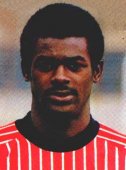
In November 1985, a young unknown player from Guadeloupe made a trial at Stade Rennais, recommended by the forward Mario Relmy who saw him playing for l'Étoile de Morne-à-l'Eau. After a successful trial, Jocelyn Angloma received an amateur contract, and started playing with the third team, before quickly joining the reserve team... then the professional squad. Just over 2 months after he arrived, he made his debut with the first team, in the Coupe de France. Not qualified to play in the first division, he would have to wait the month until March to make his debut in the top division. Angloma who played as a midfielder at the time, quickly made a place for himself in the professional team. In 1987, Stade Rennais was relegated in Division 2, but Angloma wanted to continue his progression and joined Lille. In the North, his reputation kept growing and he signed with PSG in 1990. In Paris, he was repositioned as a right back and made his debut with the French national team. One year later, he signed with the French champion Marseille where he became once again an important player. After winning the Champions League with OM, he decided to play overseas, first in Italy then and mainly in Spain. Exemplary for five years with Valence FC, he played as professional until he was 37 years old. Then he returned to Guadeloupe, played for his former team Morne-à-l'Eau and became scout for LOSC. Indefatigable, he had another taste of top level by playing in the 2007 Gold Cup with the team of Guadeloupe, at the age of 42.
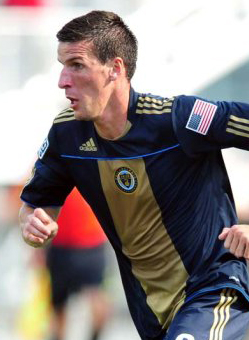
Trained at the Stade Rennais, Sébastien Le Toux won the Gambardella Cup in 2003. Not retained by Stade Rennais a year later, he becomes professional at FC Lorient. In the Morbihan, he only plays about ten Ligue 2 matches in two years, and was eventually, once again, let go by his club. Unemployed during several months, he decided to exile to the United States and signed a contract to play in the USL (The American second division) with the Seattle Sounders. Trained as a defender, he was then repositioned as an attacking midfielder, or even as a supporting striker. A good decision for Seattle, since Le Toux went on to score countless goals and reveal himself as one of the best players in the league. At the end of 2008, the Sounders were involved in the creation of the new league (MLS, first tier of American football). He remained at the club for one more year before being transferred to Philadelphia Union in November 2009.
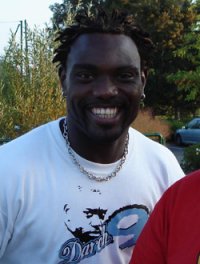
Born in Guyana, Jean Claude Darcheville arrived in mainland France in 1995 to sign for Stade Rennais. After two initial seasons in which he barely played (four games in D1 in two years), he gained more play time in 1997-1998, before moving on loan to Nottingham Forrest. After the English club didn’t keep him, he joined the FC Lorient where he finally broke through. After two seasons with over ten goals scored, he blossomed in D1 and scored nineteen goals. Better, Darcheville played a dominating role in the excellent performances by “Les Merlus” in the cup competitions, scoring the winning goal in the Coupe de France final. While Lorient was relegated, Darcheville was logically transferred. He landed in Bordeaux where he would remain for the following five seasons, alternating the good with the less good. After he left the Girondins in 2007, he drifted from club to club, with experiences in Scotland with the Glasgow Rangers, in L1 with Valenciennes, in L2 with Nantes, or in Greece with Kavala.
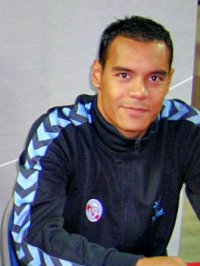
Born in Paris and trained at PSG, Grégory Paisley never really made it at the capital’s club. In January 2001, Stade Rennais recruited him to add a little more competition to the left-back position, but there too he struggled to break through. In a season and a half, he only started twenty-five games. After a season-long loan at Le Havre, the club sold him to FC Sochaux. Since then, Paisley played for a few Ligue 1 clubs. In June 2011, he joined Guingamp on a one-season contract.
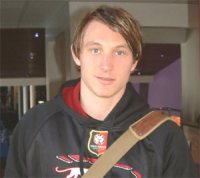
Arrived during the winter transfer window of the 2003-2004 season, the Swedish international soon conquered the heart of Rennes’ public with his class and by his repeated decisiveness. A real pacemaker, responsible of the attacking phases, Kim became one of the centrepieces of Laszlo Bölöni’s team. After having delighted the Rennes supporters with many goals and assists, the Swedish finally decided to join the Olympique Lyonnais in June 2006. Regularly called in Swedish national team, he went on to win many trophies with Lyon.
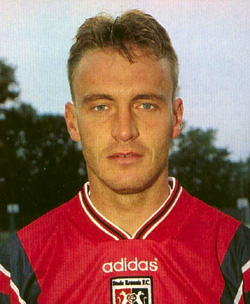
Trained in Brest Armorique, Stéphane Guivarc'h started in D1 with the Finistere club. When the club had to bid farewell to professionalism after its bankruptcy, Guivarc'h packed up and arrived close to Brest, at Guingamp. In this club, engaged in D2, he became a promising scorer. His 23 goals scored during the 1994-1995 season seduced AJ Auxerre, who enrolled him in July 1995. His adaptation to D1 was difficult and Guivarc'h only took a minor part in the cup-championship double achieved by the club from Bourgogne in 1996. Loaned to Stade Rennais the following year, he truly exploded under the red and black jersey. With 30 goals scored in a single season, he did better than simply replacing Marco Grassi, and was consecrated the best goal scorer of the championship. Returning in Auxerre next season, he was crowned the best goal scorer for the second consecutive time and was called to the France squad with which he won the World Cup. Then at the peak of his career, he sadly missed several major opportunities to score in the final against Brazil. Despite the title, this World Cup remained a personal failure on a personal level, which wouldl follow him for the rest of his career. Transferred to England after the World Cup, his experience at Newcastle turned out to a stinging failure and he didn’t significantly succeed at Glasgow Rangers either, for the second part of the 1998-1999 season. Back to Auxerre, he scored around twenty times in two years, and then finished his professional career at Guingamp. After a brief experience in Guingamp’s staff, he started a commercial career but fulfils several activities at the same time. He is thus coach of US Trégunc, an amateur team of South-Finistere, and occasionally comments football matches on TV
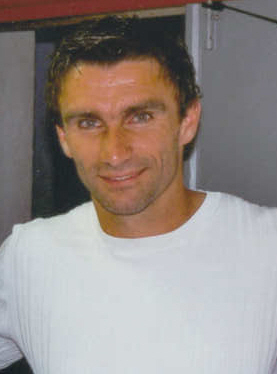
While he played for Saint-Brieuc, Patrice Carteron drew the attention of the Stade Rennais. By a combination of circumstances, both parts failed to agree and Carteron started his professional career with Laval, then in Division 2. Recruited two years later by Stade Rennais, he became the team’s immovable left defender. Defender with a sense of duty, he played about a hundred matches with the red and black jersey, before he was recruited by the Olympique lyonnais. He continued is progression there during three years, and then he signed at Saint-Étienne in 2000, just before Lyon’s greatest era began. He stayed in the Forez for five years, three in L2 and two in L1. Ending his player career at AS Cannes, he started his new life there, first as recruiter and then as manager of the first team. In june 2009, he became the coach of Dijon, in L2. In June 2011, he gained promotion to Ligue 1 with Dijon.